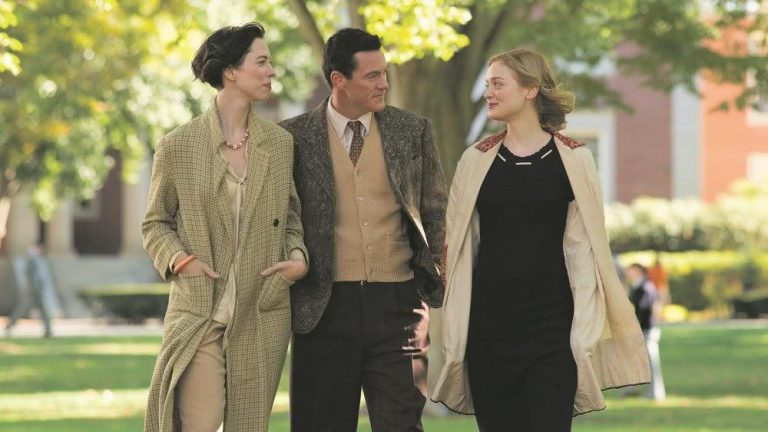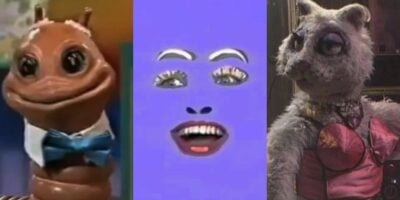I experienced my favourite moviegoing moment of the year during a Friday night showing of Professor Marston And The Wonder Women. I mean, the entire film could easily count as one long, ecstatic, unforgettable cinematic moment – I don’t remember the last time a movie prompted such delirious joy in me – but the particular scene I’m speaking of contained a very special kind of pleasure.
The moment comes about 20 minutes into the film. It’s 1927, and we’re at Harvard’s sister school Radcliffe in the cosily autumnal-toned eastern United States. Psychology Professor William Moulton Marston (Luke Evans) and his accomplished researched partner/wife Elizabeth (Rebecca Hall) have been asked by keen student Olive (Bella Heathcote) to observe a sorority initiation where the underclassmen dress as infants and are spanked by the seniors; an event of unguarded kink in an institutional space that very much shuns such things.
The girls line up, and Olive is commanded to “discipline” her charges over one knee. And as the moment of punishment approached, I began to feel the mood in the theatre change, the unsuspecting audience slowly realising what they were about to watch. I could practically sense their buttocks clench, and the cinema rang with a sharp collective inhale. The reactions ranged from pearl-clutching alarm to delight, with one audience member muttering, “come on”, encouragingly under their breath when Olive was handed the paddle.
But regardless of the specific response, one thing proved clear: the audience was completely thrown by such an act being shown so matter-of-factly. “What film am I watching?” seemed to be the question the audience was asking itself. And despite first appearances, the answer is something pretty goddamn revolutionary. After all, Professor Marston frequently feels like the cinematic equivalent of a Trojan Horse, effortlessly interrogating taboos and gender and sexual roles and doing so in the most subversive possible way, undoing a myriad of expectations all the while.
It’s a biopic concerned with a fascinating but widely unknown story – William would go on to create the Wonder Woman comic book and a breakthrough version of the modern lie detector test, all with the help of the titular Wonder Women, Elizabeth and Olive, the trio happily living together in a polyamorous relationship.
On first glance, the film is custom-designed to appease. It’s all homely yellows and oranges, and there’s a cushy framing device of a mostly flashback-driven interview between Marston and Child Study Association of America director Josette Frank (Connie Britton). Everything looks very strait-laced, swathed in wool sweaters and hidden behind old wooden doors. But first impressions are deceiving, and the seeds of subversion are sewn from the opening scenes, when William and Elizabeth lock eyes with Olive in a classroom.
The Marstons and Olive quickly fall in love and build a life together over the course of decades, their story laid out via a second framing device using Marston’s DISC theory (dominance, inducement, submission, compliance). Friends since childhood, the Marstons’ love only growing when Olive enters the picture, and the problems they face aren’t amongst themselves, but instead against a society that hasn’t caught up with such beautiful possibilities.
Professor Marston frequently feels like the cinematic equivalent of a Trojan Horse
The trio bristle up against the rules of Radcliffe, testing their attraction across tables in dark speakeasies, and at picnics. Indeed, the breakthrough for their lie detector test is discovered during attempts to finally voice their true desires – in a moment that shows how carefully attuned they are to one another, Elizabeth observes how the blush rises on Olive’s cheeks and her voice shakes when she lies, the trio then concluding that blood pressure is the key to measuring the truth.
But despite the hardship the heroes of the film face, there is a buoyant hope and playfulness that defines every single one of their actions, further imbuing the film with a revolutionary energy. The audience frequently begin to feel themselves like the subject of a psychological test conducted by director and writer Angela Robinson, who controls Professor Marston’s emotional energy so confidently and freely that she’s able to switch between tones with a single expertly directed line reading. I skate around one in particular, because it’s a moment that should remain unspoiled – not to mention one that goes down as one of my favourite pieces of direction and acting I’ve seen this year.
That confidence and skill is visible in all of Robinson’s directorial choices; particularly in the remarkable chemistry between the three leads, who bounce off each other with an infectiously intelligent glee that comes with discovering not only an emotional and sexual but also intellectual soulmate.
They spar with a dizzying well-readness, and though they are shunned by the world, they remain adored by their partners; they are outsiders who have at last found understanding in the life they have created with one another. Robinson keeps the proceedings light and fun even during the sex scenes, during which the trio experiment with costumes and bondage.
After all, after watching countless films where sex is played as a deadly serious act, it is refreshing to find sex viewed as something playful, beautiful, and integral to a character’s sense of self. “People play roles in everyday life,” a character says in the third act as the Marstons witness a demonstration of bondage. “Fantasy is possibility”. Certainly fantasy, even in the most surprising places, can start a revolution.
Professor Marston And The Wonder Women is in Australian cinemas now.

































